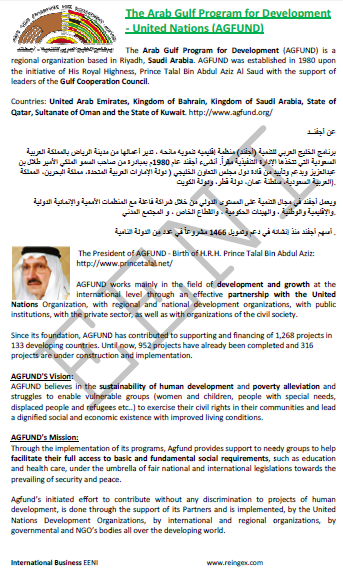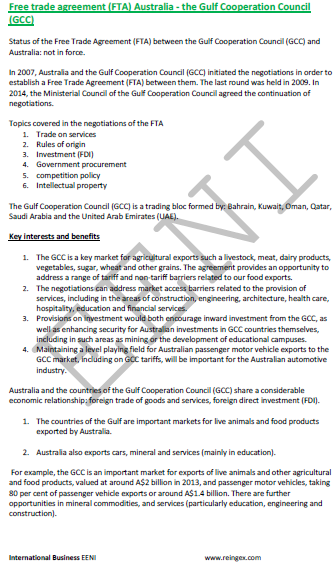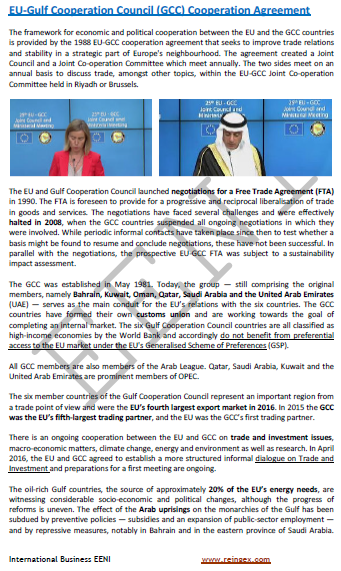Gulf Cooperation Council (GCC)

Cooperation Council for the Arab States of the Gulf
- Introduction to the Cooperation Council for the Arab States of the Gulf (Middle East): Bahrain, Kuwait, Oman, Qatar, Saudi Arabia, and the Emirates
- Objectives of the GCC
- Organizational structure of the GCC
- Economic, international trade and customs cooperation
- Customs Union of the GCC
- Monetary Union and Single Currency of the GCC
- Economic agreement between the Gulf Cooperation Council States (GCC)
- Implementation procedures of the GCC Customs Union
- Federation of the GCC Chambers of Commerce
- Trade between the members of the GCC. Foreign Trade statistics
- Arab Gulf Programme
- Economic relations with other economic groupings
- Trade Agreements with Australia, New Zealand, Japan, Singapore, Thailand, Bahrain, India, MERCOSUR, EFTA, and the EU
- Greater Arab Free-Trade Area (GAFTA)
The objectives of the subject “Gulf Cooperation Council (GCC)” are the following:
- To understand the aims and structure of the GCC
- To evaluate the benefits for the member countries of the GCC and the areas of cooperation (economic, trade, customs)
- To analyze the economic integration process (Customs Union) and the international trade among the member countries of the GCC
- To understand the monetary union of the GCC
- To analyze the international relations and the trade agreements of the GCC
Cooperation Council for the Arab States of the Gulf (GCC):
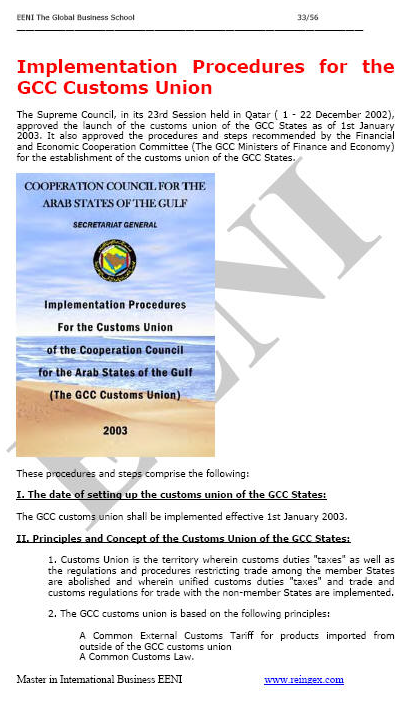

The Subject “Cooperation Council for the Arab States of the Gulf (GCC)” belongs to the following Online Programs taught by EENI Global Business School:
Doctorate: Islamic Business, World Trade.

Masters: International Business, Foreign Trade.
Languages:  or
or  Consejo de Cooperación del Golfo
Consejo de Cooperación del Golfo  Conseil de coopération du Golfe.
Conseil de coopération du Golfe.
- Credits of the Subject “Gulf Cooperation Council”:
1

- Duration: one week

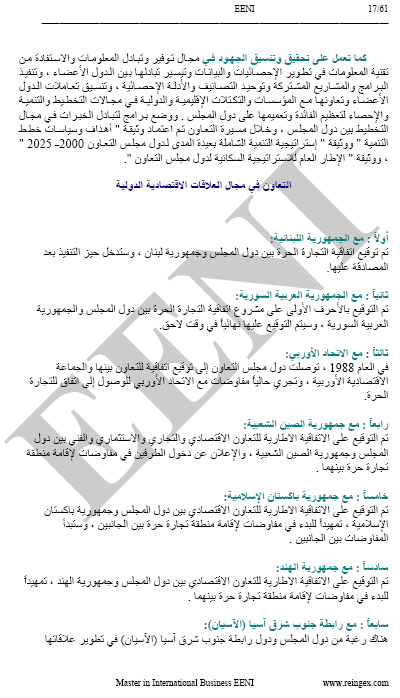

Cooperation Council for the Arab States of the Gulf:
The Cooperation Council for the Arab States of the Gulf (GCC) is an international trade bloc involving the United Arab Emirates, the Kingdom of Bahrain, the Kingdom of Saudi Arabia, the Sultanate of Oman, the State of Qatar, and the State of Kuwait with many economic and social objectives: the Gulf Cooperation Council Common Market and the Customs Union.

The Charter of the Cooperation Council for the Arab States of the Gulf states that the core objectives are the coordination, integration and inter-connection between the member economies in all fields, strengthening the ties between their peoples, formulating similar regulations in various spheres: economy, finance, foreign trade, customs, tourism, legislation, administration, as well as the scientific and technical progress encouragement in the industry, mining, agriculture, water and animal resources, establishing scientific research centers, creation of joint ventures...
In 2002, the Supreme Council of the GCC approved the launch of the customs union of the Cooperation Council for the Arab States of the Gulf States (entered into force in 2003).
It also approved the procedures recommended by the Financial and Economic Cooperation Committee (Gulf Cooperation Council Ministers of Finance and Economy) for the creation of the customs union of the Cooperation Council for the Arab States of the Gulf States.
The Gulf Cooperation Council (GCC) economies have gone so far in the field of the bilateral trade cooperation. They have enhanced such cooperation for the benefit of the Cooperation Council for the Arab States of the Gulf States and citizens, which would consequently improve the Foreign direct investment and the international trade climate.
The objectives of the trade cooperation between the Cooperation Council for the Arab States of the Gulf States are summed up in the effort to eliminate the tariffs and the Technical Barriers to Trade among the Gulf economies with respect to their export products, exempt such products from customs duties and accord them a national treatment, coordinate exportation and importation policies, and create a collective negotiating power.
The Gulf Cooperation Council (GCC) belongs to the Arab Economic Area (Islamic Civilization).
Gulf Cooperation Council Free Trade Agreements (لمجلس التعاون لدول الخليج العربية):
- India-CCG Agreement (الهند - دول مجلس التعاون الخليجي اتفاقية التجارة الحرة)
- US-Bahrain Agreement
- Agreement on economic cooperation between the Cooperation Council for the Arab States of the Gulf and the MERCOSUR
- EU-Cooperation Council for the Arab States of the Gulf Cooperation Agreement (الاتحاد الاوروبي - مجلس التعاون الخليجي اتفاقية التجارة الحرة)
- Australia-GCC FTA
- Gulf Cooperation Council Trade Agreements: the ASEAN, New Zealand, Japan, Singapore, Thailand, Bahrain, MERCOSUR, EFTA
- Corridor of the Ashgabat Agreement
- North-South Corridor (India-Russia)
- (اتفاقيات التجارة الحرة لدول مجلس التعاون الخليجي: الاسيان واستراليا ونيوزيلندا واليابان وسنغافورة وتايلاند والبحرين وميركوسور، رابطة التجارة الحرة الأوروبية)
Omani Trade Agreements: U.S., Indian-Ocean Rim Association...
Case Study: prominent Muslim Businessman in the Gulf Cooperation Council (GCC) region:
- HRH Al Waleed Bin Talal
- Sulaiman Al-Rajhi
- Lubna Olayan
- Mohamed Bin Issa Al Jaber
- Mohammed Hussein Ali Al-Amoudi
- Hayat Sindi
- Yusuf Bin Ahmed Kanoo
- Majid Al Futtaim
- Lubna Bint Khalid Al Qasimi
- Abdul Aziz Ghurair
- Reem Ebrahim Al-Hashimi
- Amina Al Rustamani
- Shaikha Al Maskari
- Nasser Al Kharafi
- Jawad Ahmed Bukhamseen
- Shaikha Al Bahar
- Maha Al-Ghunaim
- Mohammed Al-Barwani
- Hanan Al Kuwari
Introducing the Gulf Cooperation Council single currency and establishing the Cooperation Council for the Arab States of the Gulf Monetary Union are the fruit of the economic integration stages achieved so far.
This will increase the advantages of the economic integration and improve the gains of the Customs Union and the Gulf Cooperation Council Common Market, as establishing the GCC Monetary Union and introducing the GCC single currency will have many impacts on the various economic sectors, especially in the Intra-Gulf Cooperation Council trade, tourism, and foreign direct investment. These impacts will mostly reveal on the financial services and capital markets, which will reach an increasing growth and speed up developments.
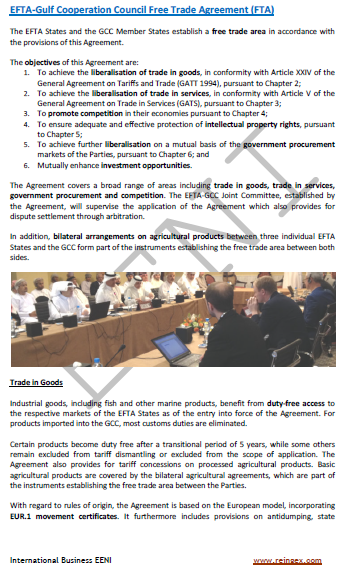
Sample of the Subject: